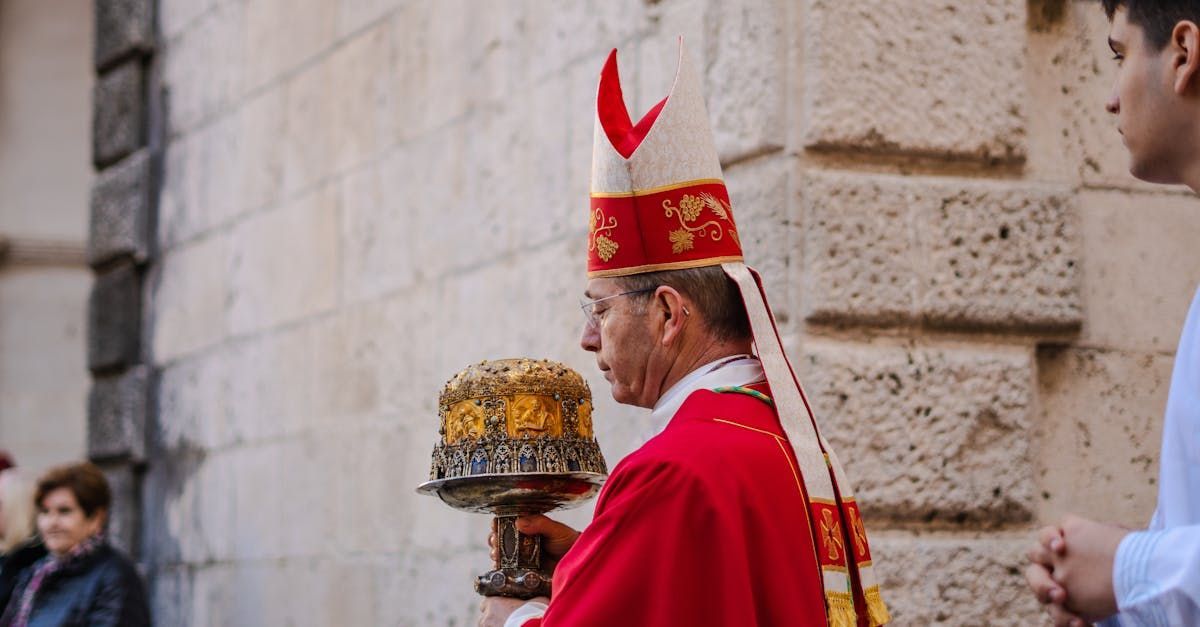¿Que hago con mi dinero?
A medida que nuestro Señor predica, la gente en la multitud reconoce cada vez más que es un hombre veraz, digno de confianza y justo. Esta es probablemente la motivación detrás del hombre que exclama: "¡Maestro, dile a mi hermano que comparta su herencia conmigo!" Me río cuando leo esto, porque esto les puede pasar a los párrocos. Una madre vino a verme una vez después de misa con un niño angustiado. Ella dijo: "Padre, dígale a mi hija que necesita estar callada en la iglesia". Respondí como Nuestro Señor. "No soy el padre de tu hija". La razón detrás de una respuesta como esta es que los padres no tienen derecho a delegar su autoridad para hacer cumplir la disciplina de la familia. Cuando estoy con mis sobrinas y una de ellas se comporta como un imbécil, me levanto, me acerco a mi hermano y le digo: "Tu hija se está comportando como un idiota". Una vez dijo: "Entonces dile que se detenga". Y yo respondí: "Ese no es mi trabajo. Solo soy el tío". Esta es mi forma sutil de mostrarles a las niñas que siempre deben mirar a su mamá y papá para recibir orientación y dirección. También tiene el beneficio adicional de que nunca tengo que ser el policía malo.
El mensaje de Cristo es similar hoy a este hombre que quiere una parte de la herencia de su hermano. En la antigua ley judía, todo lo que pertenece al padre pasa al hijo mayor cuando muere. El hijo mayor se hace cargo de las deudas de su madre y su padre con las ganancias. Pero se convierte en su propia posesión. Dado que es su propiedad privada, es decisión del hijo mayor cómo distribuirlo, si es que lo distribuye. Cuando el Señor dice: "Yo no soy el árbitro ni el juez en este caso", quiere decir que la forma en que alguien usa sus bienes temporales no le corresponde al Señor ordenar con ninguna ley precisa. Él no dice: "Un mandamiento nuevo les doy: cuando reciban una herencia, la compartan equitativamente entre los hijos". De nada. En lugar de involucrarse en asuntos temporales, les enseña cómo deben considerar los recursos temporales, como el dinero y los productos—el fruto de su trabajo. Entonces les cuenta la parábola del rico insensato.
Cuando este hombre tiene una gran cosecha, no sabe qué hacer consigo mismo. Pero después de un momento, se da cuenta de que puede almacenarlo todo y prácticamente jubilarse. Almacenará su grano y producirá en grandes graneros. Entonces puede comer, beber, descansar y disfrutar de sus riquezas. Pero luego viene la voz de Dios: "¡Insensato! ¿No sabes que esta misma noche te quitarán la vida?"
En el fondo, podemos ver una similitud entre muchos de nosotros y este rico insensato. Prácticamente está diciendo: "Las ganancias de este año son tan buenas que puedo planear jubilarme antes de tiempo". Y muchas veces podemos pensar de la misma manera. Buscamos atajos y trucos que nos hagan la vida más fácil y cómoda. Creemos que será un poco más fácil si obtengo un ascenso o me cambio a otra empresa. Tal vez gane más dinero si me involucro más en los mercados y el comercio. Una vez que termine la escuela secundaria y me mude a la universidad, la vida será más fácil. A veces tengo que aconsejar a parejas antes de la boda que piensan: "Una vez que estemos casados, nuestra relación mejorará mágicamente". Por supuesto, ahí es cuando los animo a sentarse y hablar con una pareja mentora que pueda disipar rápidamente la noción de que el matrimonio puede resolver algunos de los problemas de la vida.
Incluso he experimentado a personas que vienen a confesarse en un momento de crisis en su familia o en su vida. Tengo que recordarles: "A través de esta confesión, Dios no cambiará las circunstancias de tu vida. Volverás a las mismas situaciones con las mismas tentaciones. Pero Dios cambiará tu corazón para responder de manera más justa y recta". Todo esto porque, como dijo Nuestro Señor en el Evangelio, Él no es el árbitro de las cosas temporales.
Entonces, digamos que recibo una herencia de un millón de dólares. No tengo ninguna obligación cristiana de dividirlo de ninguna manera. Puedo yo elegir cómo uso ese millón de dólares. Recuerde, Dios no es el árbitro de ese dinero. Sin embargo, me ha enseñado qué tipo de mentalidad debo tener sobre ese dinero. Él me ha enseñado a través del Evangelio de hoy que debo considerar cada pertenencia personal como fugaz.
Ya sea con dinero o alguna otra circunstancia personal, debo aceptar a quién Dios creó y la situación personal de mi vida en el momento presente. No puedo pensar en que si Dios me creó más inteligente. Entonces, tal vez, podría luchar con el pecado de engañar a otros. No puedo pensar en que si Dios me creó más guapo. (Obviamente, como todos saben, no hay forma de que él me haya creado más guapo). Volvamos al ejemplo. Si Dios me creó más guapo con una mejor constitución, podría luchar más con los pecados de la lujuria. Si mis circunstancias personales fueran tales que ganara mucho más dinero, podría luchar contra la tacañería y la avaricia.
Al mismo tiempo, debo estar agradecido por lo que tengo y por lo que soy. Debo dar gracias a Dios por mi salud tal como está, ni mejor ni peor. Porque en un instante, me lo pueden quitar. Debo planificar para el futuro y tener una cuenta de ahorros saludable. Pero, de nuevo, si trato mi dinero como si no fuera mío, sino para las obras de Dios, la familia y el ocio adecuado, es menos probable que lo guarde todo para mí. Al final, este debe ser nuestro lema diario con todo lo que poseemos y aceptando lo que somos. Todos los días debemos decir: "Señor, todo lo que tengo, todo lo que soy, todo lo que gano o pierdo hoy, es todo tuyo. Haz, Señor, edifica o derriba según tu voluntad".
Esta es la mentalidad que Cristo nos enseña con respecto al dinero, las posesiones, la estatura personal. Y la razón es esta: Cristo se preocupa principalmente de nuestra salvación. No he sido sacerdote por mucho tiempo, pero he acompañado a muchas personas en su lecho de muerte. Es un privilegio poder llevar el sacramento de los enfermos y el viático a quienes están llegando al final de su peregrinaje terrenal. Por lo general, hay dos tipos de personas en esos momentos que cada uno de nosotros enfrentará algún día. Están las personas que han vivido su vida con la filosofía de que en cualquier momento se les puede exigir la vida. Se han aferrado fielmente a las realidades espirituales de la comunión con Jesús, y no se aferran a nada de este mundo. Están listos para estar con su Salvador. Y luego están los casos más tristes de personas temerosas y arrepentidas. Tratan de aguantar porque tienen algo de arrepentimiento o algo que todavía quieren hacer. Luchan y negocian con Dios y oran por una recuperación milagrosa. De mi parte como sacerdote, es una cuestión de guerra espiritual. Pero estas son generalmente las personas que buscaron la eternidad entre las posesiones terrenales que no saben cómo desprenderse de la creación visible para pasar a su patria eterna.
Entonces, prestemos atención a la enseñanza de Nuestro Señor y pongámosla en práctica. Nunca busquemos la seguridad y la felicidad exclusivamente en esta vida. Nada es seguro en la vida. Como el tonto rico, esta misma noche nuestra vida podría ser arrebatada. Estemos dispuestos en cualquier momento a sacrificar cualquier cosa por la unión con Nuestro Salvador. Y mientras tanto, usemos sabiamente las cosas de la tierra para aferrarnos a las cosas que duran eternamente.
Ahora, si alguno de ustedes recibe una herencia de un millón de dólares y no sabe qué hacer, por favor venga a verme y puedo ayudarlo. Jesús podría no decir que necesita ser compartido, ¡pero tu párroco lo hará!
Pastor's Ponderings












